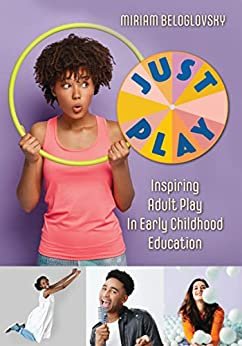Lately, as I talk with educators, I hear despair about what they must do in their work with children. The constant demands to meet standards have been chipping away at their creativity and ability to play.
In my new book, Just Play! (available for pre-order) I share the gift of playfulness. I want to share the power of play so that, as educators, we give children more opportunities to play. I want us to chase our best and let go of expectations that say we need to fulfill outcomes dictated by society. I hope we can learn to trust that playful inner part of our life.

Most importantly, I want us to recapture our childhood genius. And I want us to give children the gift of play so that they can discover their passion and hidden genius. Children know their own best, and the role of adults is to trust that knowledge. But before we can allow children to be their best, we must find our best selves in all its definitions, manifestations, and representations.
I invite you to reflect on what play and learning mean to you:
- Are you pushing yourself and children to chase “the best” defined by societal rules at the expense of pursuing their innate need to play?
- What are the long-term repercussions of that constant external push for the best?
- Can we change our perspective and accept the authentic best in ourselves and each child?
My hope is that your reflections will lead you to rekindle your ability to play.

Play is crucial in adulthood because it fosters adaptiveness, creativity, role rehearsal (trying out new roles or possible careers), and mind-body integration. Adults who engage in play and creative endeavors find their childlike center that cultivates happiness and joy. Play is affirming because it allows us to enter a natural, safe, and caring environment to explore our inner thoughts and desires freely.
If you ask me how I learned that play is essential, I cannot give you a single answer. I went to college to learn about human development and counseling. I studied under renowned scholars and grew my practice with incredible mentors, and I am still unsure how I learned to value play. I have seen many children (including my own) engaged in play, laughing, and existing entirely in the creative flow. I probably don’t have an answer because play is multifaceted, and sometimes we are confused by it’s complexity.
I know that we are unique in how we approach play and learning because we create our own identities. No single perfect answer or experience validates what we know. Only an inquisitive attitude allows us to see things from multiple perspectives. We play to be, to explore the possibilities of being someone different. We play to dream about who we will become. We play because it is transformational. We learn from play because our hearts, soul, and mind are open to diverse perspectives and realities. When we play as adults, we can see children for their unique way of being in the world.

I invite you to find ways to play every day. When we play, we enter into a state of flow, as described by Mihaly Csikszentmihalyi (1997)—the flow that comes when you are fully immersed in a pleasurable and intriguing process. Being in a state of flow brings a highly focused level of consciousness that promotes innovation. When we are playful, we can think flexibly, take risks with ideas, and allow our creative thoughts to emerge. Play has its intrinsic rewards. We know that at the heart of play is the pleasure of engaging in the activity or thought process for its own sake, without the expectation of being rewarded or recognized. But play can bring material rewards too, for instance, when we see the outcomes of successful innovation that benefit colleagues, children, and families.